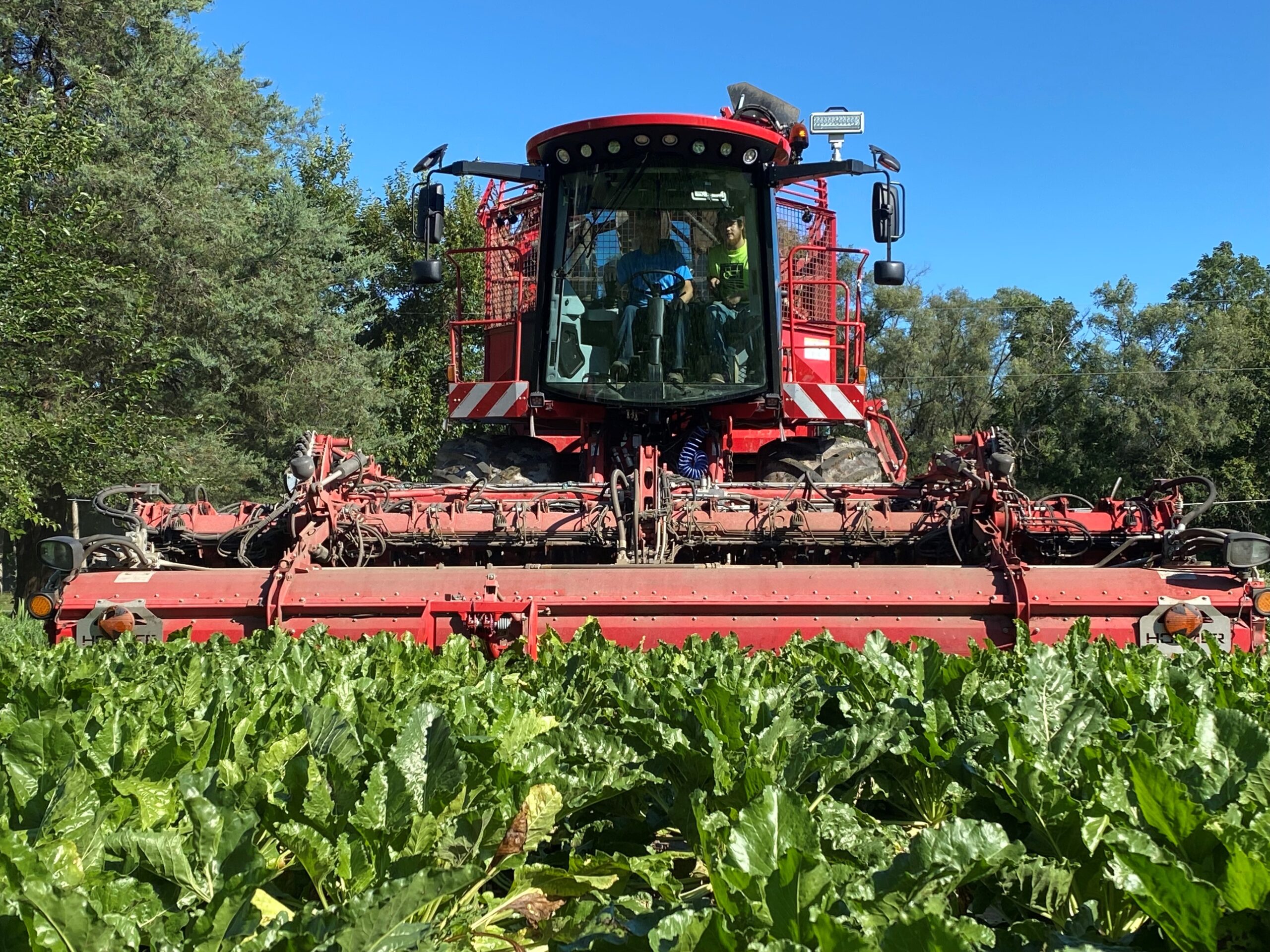Permanent piling gets underway Oct. 22; officials predicting a yield of 34 tons per acre
BAY CITY – As Michigan Sugar Company begins the full harvest of its 2021 sugarbeet crop on Friday, Oct. 22, co-op officials are predicting a potential record yield of 34 tons per acre, up from the previous record of 31.64 tons per acre set in 2015.
Early harvesting of sugarbeets began on Aug. 16, 2021, and to date about 25% of the crop has been dug from the roughly 162,000 acres planted this year by the company’s nearly 900 grower-owners. With full harvest comes the formation of permanent beet storage piles at the company’s factories in Bay City, Caro, Croswell, and Sebewaing, as well as its 11 other piling stations.
“This is always a very exciting time of year for us and there is great anticipation about the potential of this crop,” said Michigan Sugar Company Executive Vice President Jim Ruhlman. “Once again, our world-class growers have done a phenomenal job caring for their sugarbeets and, with a little help from Mother Nature, we will now reap the benefits.”
During a typical year, Michigan Sugar Company’s grower-owners harvest about 4.6 million tons of sugarbeets. The number this year could end up around 5.4 million tons. The size of the crop, coupled with a wet October that delayed the start of full harvest by about a week, does present some challenges.
“With such a large crop in the field, harvest will be long, tight, and somewhat unusual,” said Ruhlman. “And once the beets are harvested and piled, then we have to get them sliced. We expect this year’s slicing campaign will wrap up in mid-April, much later than most campaigns that typically wrap up in early to mid-March.
“Storing and slicing sugarbeets into April brings with it a lot of unknowns, especially related to temperature and weather,” Ruhlman continued. “These are good challenges to have, but they are challenges nonetheless.”
Due to the expected size of the crop, Michigan Sugar Company’s Board of Directors voted last week to authorize possibly asking growers to leave up to 5% of their acres unharvested. A final determination about that will be made around Nov. 1.
“The size of the crop directly impacts how many days it will take to slice all of the harvested sugarbeets,” said Ruhlman. “We don’t want to run into a situation where our harvested beets are decomposing beyond a usable state in the piles. That is what is driving our decision about possibly leaving sugarbeets in the field.”
To date, more than 1.3 million tons of sugarbeets have been delivered for processing at Michigan Sugar Company’s four factories. During the early harvest period, sugarbeets delivered to the factories are sliced within a couple days. Since the factories began operation in mid-August, more than 318 million pounds of sugar has been extracted. By the end of campaign, Michigan Sugar Company will have produced more than 1.3 billion pounds of sugar.
Facility Update
As this year’s sugarbeet slicing campaign continues, Michigan Sugar Company also has two significant projects underway, both at its facility in Bay City.
The first is a $2 million expansion of the company’s packaging operation aimed at increasing Michigan Sugar Company’s capacity to produce packages of consumer brown sugar. The project involves installation of a new brown sugar packaging machine, sugar transport system and the infrastructure to add another line in the future.
The Bay City operation currently can make 750,000 2-pound bags of brown sugar per week. After the expansion, that capacity will be more than 1 million bags per week.
Work also is underway on a more than $65 million project to construct a new molasses desugarization facility at the Bay City factory. The facility will allow Michigan Sugar Company to produce up to an additional 80 million pounds of sugar annually from molasses that is a byproduct of the process through which sugar is extracted from sugarbeets. Currently, Michigan Sugar Company has the capacity to extract additional sugar from 60% of its molasses. The new factility will allow the company to extract additional sugar from 100% of its molasses.
The project is expected to take 18 to 24 months to complete. Once operational, the company expects to process as much as 650 tons of molasses daily, up from the current amount of 325 tons per day.
“This enormous undertaking, investment, and commitment by our growers-owners will have a multi-generational impact for our cooperative,” said Mark Flegenheimer, President and CEO of Michigan Sugar Company. “This is a historic project for our owners, our employees, our customers, and our community.”
Flegenheimer explained the economic impact the new facility will have.
“Simply put, we can sell sugar at a higher price than we sell molasses,” he said. “Our grower-owners will see added annual revenue of $10 million to $15 million, in perpetuity.”
Now Hiring
Michigan Sugar Company continues to hire both seasonal and year-round employees. Those interested in seasonal, harvest-related jobs should go to www.michiganbeetharvest.com. Those interested in planting their career with the company can check out available jobs at www.michigansugar.com. Once there, click on the “Careers” tab at the top of the page and then click on “Current Openings.”
On the Road Again
Finally, Michigan Sugar Company reminds motorists that the start of full harvest means an uptick in the number of sugarbeet trucks that will be on the road hauling our sweet crop from farm fields to factories and piling stations throughout the area.
About Michigan Sugar Company
Michigan Sugar Company was founded in 1906 when six smaller sugar companies merged their operations. In 2002, Michigan Sugar Company became a grower-owned cooperative and in 2004, it merged with Monitor Sugar Company to form the company that exists today.
Michigan Sugar Company is headquartered in Bay City and has sugarbeet processing facilities in Bay City, Caro, Croswell and Sebewaing, Michigan. The company’s nearly 900 grower-owners plant and harvest about 160,000 acres of sugarbeets each year in 21 Michigan counties, as well as Ontario, Canada. Those beets are sliced at the factories and turned into about 1.3 billion pounds of sugar annually.
The sugar is sold to industrial, commercial, and retail customers under the Pioneer and Big Chief brands.
Michigan Sugar Company has 930 year-round employees and an additional 1,100 seasonal workers. It is the No. 1 employer in Huron County, the No. 2 employer in Bay and Sanilac counties and the No. 3 employer in Tuscola County. The company’s annual payroll is more than $65 million and its annual local economic impact is about $500 million.
Michigan Sugar Company is the third largest of nine sugarbeet processing companies in the United States and Michigan is one of 11 states where sugarbeets are grown in the country.









